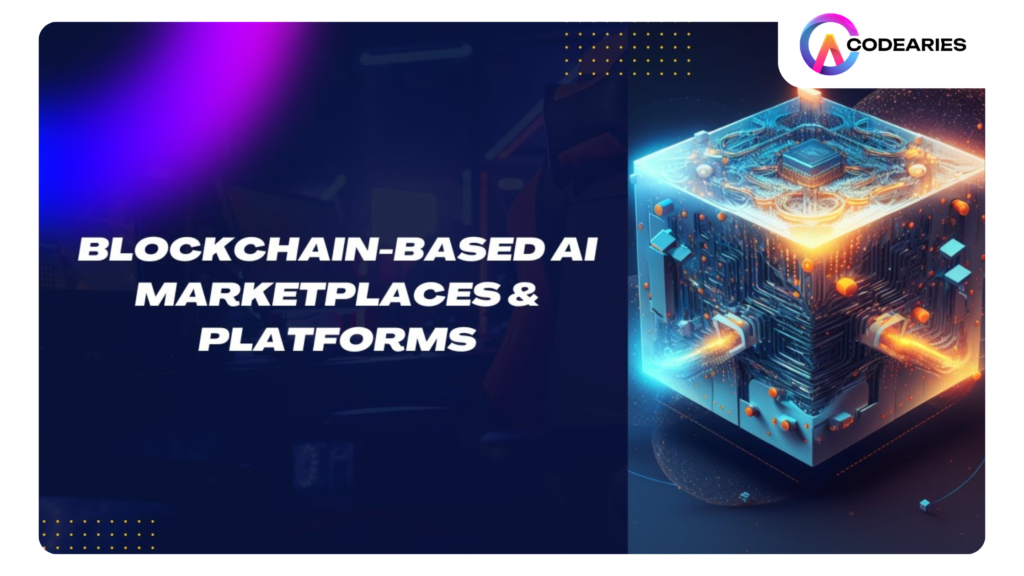Blockchain-Based AI Marketplaces: Democratizing Access to AI Technologies

Introduction
The advent of blockchain technology has catalyzed a wave of innovation across various sectors, from finance to supply chain management. One of the most exciting developments is the emergence of blockchain-based marketplaces for AI services and datasets. These platforms promise to democratize access to AI technologies, allowing individuals and organizations to buy, sell, and share AI resources in a decentralized and secure manner. By leveraging the unique properties of blockchain—transparency, security, and decentralization—these marketplaces can address many of the challenges currently faced in the AI ecosystem.
Additionally, we will highlight how leading IT software development company CodeAries can help develop such platforms, bringing these innovative solutions to life.
Understanding Blockchain-Based AI Marketplaces
What are Blockchain-Based AI Marketplaces?
Blockchain-based AI marketplaces are decentralized platforms where AI services and datasets can be traded securely and transparently. These marketplaces utilize blockchain technology to ensure that transactions are immutable, verifiable, and conducted without intermediaries. This decentralized approach offers several advantages, including enhanced security, reduced costs, and increased accessibility.
How Do Blockchain-Based AI Marketplaces Work?
- Listing AI Services and Datasets: Providers of AI services (such as machine learning models, algorithms, and analytics) and datasets list their offerings on the marketplace. These listings include detailed descriptions, usage terms, and pricing.
- Smart Contracts: Transactions on the marketplace are governed by smart contracts—self-executing contracts with the terms of the agreement directly written into code. Smart contracts automate the execution of transactions, ensuring that the terms are enforced without the need for intermediaries.
- Tokenization: Many blockchain-based AI marketplaces use tokenization to facilitate transactions. Providers and buyers use platform-specific tokens to buy and sell services and datasets, streamlining the payment process and ensuring security.
- Decentralized Storage and Compute: To handle the storage and computation needs of AI services and datasets, these marketplaces often integrate with decentralized storage solutions (like IPFS) and decentralized compute networks. This ensures data integrity and availability while reducing reliance on centralized infrastructure.
- Reputation Systems: To build trust within the marketplace, reputation systems track the reliability and quality of providers. Users can rate and review services, helping others make informed decisions.
Benefits of Blockchain-Based AI Marketplaces
Democratizing Access to AI
One of the most significant benefits of blockchain-based AI marketplaces is the democratization of access to AI technologies. By lowering barriers to entry, these platforms enable a broader range of individuals and organizations to leverage AI. This democratization has several key implications:
- Innovation: Startups, small businesses, and independent developers gain access to powerful AI tools and datasets, fostering innovation and enabling them to compete with larger, well-funded enterprises.
- Diversity: A more diverse group of users and contributors can lead to a wider variety of AI applications and solutions, addressing a broader range of problems and needs.
- Inclusivity: By making AI resources more accessible, these marketplaces can help bridge the gap between different regions and socioeconomic groups, promoting inclusive technological development.
Enhanced Security and Transparency
Blockchain technology inherently offers enhanced security and transparency, which are critical for AI marketplaces:
- Immutable Transactions: All transactions on the blockchain are immutable and verifiable, ensuring that the history of AI services and datasets can be traced accurately.
- Data Integrity: Decentralized storage solutions ensure that datasets remain unaltered and accessible, preventing tampering and data loss.
- Trustless Environment: Blockchain eliminates the need for intermediaries, allowing transactions to occur directly between parties. This trustless environment reduces the risk of fraud and increases confidence among users.
Cost Efficiency
By removing intermediaries and leveraging decentralized infrastructure, blockchain-based AI marketplaces can reduce costs for both providers and buyers:
- Lower Transaction Fees: Transactions on the blockchain are typically cheaper than those involving traditional intermediaries.
- Reduced Overheads: Decentralized storage and compute solutions can be more cost-effective than centralized alternatives, lowering the overall cost of AI services.
- Efficient Resource Utilization: The decentralized nature of these marketplaces allows for more efficient use of resources, optimizing costs and improving scalability.
Incentivizing Contributions
Blockchain-based AI marketplaces can incentivize contributions through tokenomics and reward systems:
- Monetization Opportunities: AI developers and data providers can monetize their contributions, earning tokens or other rewards for their services and datasets.
- Community Engagement: Token-based incentives can foster a vibrant community of contributors and users, driving continuous improvement and innovation.
Use Cases of Blockchain-Based AI Marketplaces
Healthcare
In healthcare, blockchain-based AI marketplaces can revolutionize the way medical data and AI models are shared and utilized:
- Secure Data Sharing: Medical institutions can securely share anonymized patient data, enabling the development of more accurate and comprehensive AI models for diagnosis and treatment.
- Collaborative Research: Researchers can access a diverse range of datasets and AI tools, facilitating collaborative efforts and accelerating medical discoveries.
- Personalized Medicine: AI models trained on diverse datasets can provide personalized treatment recommendations, improving patient outcomes.
Finance
The finance sector can benefit significantly from blockchain-based AI marketplaces:
- Fraud Detection: Financial institutions can access advanced AI models for fraud detection, improving the accuracy and efficiency of their systems.
- Risk Management: AI-driven risk management tools can be shared and utilized across the industry, enhancing the ability to predict and mitigate financial risks.
- Algorithmic Trading: Traders can access sophisticated AI algorithms for algorithmic trading, optimizing their strategies and increasing profitability.
Supply Chain
In supply chain management, blockchain-based AI marketplaces can enhance transparency, efficiency, and resilience:
- Traceability: AI models can analyze data from across the supply chain, providing real-time insights into the provenance and status of goods.
- Demand Forecasting: Companies can leverage advanced AI tools for demand forecasting, optimizing inventory levels and reducing waste.
- Supplier Evaluation: AI-driven evaluation tools can assess supplier performance and reliability, helping companies make informed sourcing decisions.
Education
The education sector can leverage blockchain-based AI marketplaces to enhance learning and administrative processes:
- Personalized Learning: AI models can provide personalized learning experiences, adapting to the needs and preferences of individual students.
- Administrative Efficiency: Educational institutions can access AI tools for administrative tasks such as admissions, scheduling, and resource allocation, improving efficiency and effectiveness.
- Research Collaboration: Researchers can share datasets and AI models, facilitating collaboration and accelerating academic research.
Real Estate
In real estate, blockchain-based AI marketplaces can streamline transactions and enhance property management:
- Automated Valuation Models: AI-driven valuation models can provide accurate and up-to-date property valuations, improving transparency and efficiency in real estate transactions.
- Property Management: AI tools can optimize property management tasks such as maintenance scheduling, tenant screening, and lease management.
- Market Analysis: Real estate professionals can access AI models for market analysis, identifying trends and making informed investment decisions.
Challenges and Considerations
Data Privacy and Security
While blockchain offers enhanced security, data privacy remains a critical concern:
- Anonymization: Ensuring that datasets are properly anonymized to protect individual privacy while maintaining their utility for AI models.
- Access Control: Implementing robust access control mechanisms to ensure that only authorized parties can access sensitive data.
- Compliance: Ensuring compliance with data protection regulations such as GDPR and CCPA, which mandate stringent data privacy and security measures.
Scalability
Scalability is a key challenge for both blockchain and AI technologies:
- Transaction Throughput: Blockchain networks need to handle a high volume of transactions efficiently to support large-scale AI marketplaces.
- Compute and Storage: The computational and storage requirements for AI models and datasets can be substantial, necessitating scalable and cost-effective solutions.
- Interoperability: Ensuring interoperability between different blockchain networks and AI platforms to facilitate seamless integration and collaboration.
Quality Control
Maintaining the quality and reliability of AI services and datasets is essential:
- Reputation Systems: Implementing robust reputation systems to evaluate and rate providers, ensuring that only high-quality services and datasets are traded.
- Verification: Developing mechanisms for verifying the accuracy and validity of AI models and datasets before they are listed on the marketplace.
- Standardization: Establishing standards and best practices for AI services and datasets to ensure consistency and reliability.
Ethical Considerations
The ethical implications of AI and blockchain technologies must be carefully considered:
- Bias and Fairness: Ensuring that AI models are free from bias and make fair and equitable decisions.
- Transparency: Providing transparency in the development, deployment, and operation of AI models to build trust and accountability.
- Accountability: Establishing mechanisms for accountability and recourse in the event of errors or misuse of AI technologies.
The Role of CodeAries in Developing Blockchain-Based AI Marketplaces
Expertise in Blockchain and AI
As a leading IT software development company, CodeAries possesses extensive expertise in both blockchain and AI technologies. This unique combination of skills enables CodeAries to develop robust and innovative blockchain-based AI marketplaces tailored to the specific needs of clients.
Customized Solutions
CodeAries specializes in creating customized solutions that address the unique requirements of each client. Whether it’s developing a decentralized marketplace for AI services, implementing advanced smart contracts, or integrating AI-driven analytics, CodeAries provides end-to-end solutions that drive value and innovation.
Secure and Scalable Platforms
Security and scalability are paramount in the development of blockchain-based AI marketplaces. CodeAries employs best-in-class security practices and scalable architectures to ensure that the platforms they develop are both secure and capable of handling high volumes of transactions and data.
Continuous Support and Improvement
CodeAries is committed to providing ongoing support and continuous improvement for the platforms they develop. This includes regular updates, maintenance, and enhancements to ensure that clients stay ahead of the curve in the rapidly evolving landscape of blockchain and AI technologies.
Future Directions
Advances in Blockchain and AI
Continued advancements in blockchain and AI technologies will drive the evolution of blockchain-based AI marketplaces:
- Improved Consensus Mechanisms: Development of more efficient consensus mechanisms to enhance the scalability and performance of blockchain networks.
- Federated Learning: Integration of federated learning techniques to enable collaborative AI model training while preserving data privacy.
- Quantum Computing: Leveraging quantum computing to solve complex AI problems and enhance the capabilities of AI marketplaces.
Expansion of Use Cases
The applications of blockchain-based AI marketplaces will continue to expand across various industries:
- Agriculture: Enhancing agricultural practices through AI-driven analytics and blockchain-based supply chain management.
- Energy: Optimizing energy production, distribution, and consumption through decentralized AI marketplaces.
- Public Sector: Improving public services through AI-powered decision-making and blockchain-based transparency and accountability.
Collaboration and Standardization
Collaboration and standardization will be crucial for the widespread adoption of blockchain-based AI marketplaces:
- Industry Partnerships: Fostering partnerships between industry stakeholders to drive innovation and adoption of blockchain-based AI marketplaces.
- Standards Development: Establishing standards and best practices to ensure interoperability, security, and compliance across platforms.
- Regulatory Frameworks: Developing regulatory frameworks that support the growth and development of blockchain-based AI marketplaces while ensuring ethical and responsible use of technology.
Conclusion
Blockchain-based AI marketplaces represent a transformative approach to democratizing access to AI technologies. By leveraging the unique properties of blockchain—decentralization, transparency, and security—these marketplaces can address many of the challenges currently faced in the AI ecosystem. The potential benefits are immense, from enhanced security and cost efficiency to the democratization of AI access and incentivization of contributions.
Despite the challenges, the future of blockchain-based AI marketplaces is promising. As technology continues to advance and collaboration among stakeholders grows, we can expect to see more sophisticated and widely adopted solutions that revolutionize the way AI services and datasets are traded. Leading IT software development companies like CodeAries play a crucial role in bringing these innovative platforms to life, driving the next wave of technological innovation and democratizing access to AI for all.







